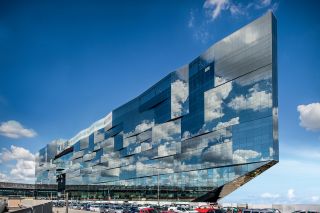Interview with Olivier Bokobza, Deputy Chief Executive Officer of BNP Paribas Real Estate in charge of Property Development and Séverine Chapus, Deputy Chief Executive Officer of Property Development (Commercial and Residential) in charge of Development at BNP Paribas Real Estate.
What are the characteristics of a resilient city?
SÉVERINE CHAPUS / Resilience is under the spotlight with Covid-19, but we can recall that this notion was already an important factor in the analysis of the consequenc-es of the 2004 tsunami in Asia. A number of studies have shown that strong social cohesion at all levels (neighbourhoods, districts, regions) was crucial for cities in returning to a ‘normal’ state after a shock of this sort. The tighter the social connec-tions, the faster it was to go back to the original state and way of functioning.
OLIVIER BOKOBZA / For me, governance has a pivotal role in the success of a resil-ient future city. It cannot come to fruition without clear and well-structured guide-lines. The political projects driven by the authorities in charge of designing the city is therefore essential.
In addition, diversity is a necessity for the future of urbanism. It represents a source of economy and life, it is the key to creat-ing a type of consumption that is genuinely local and has an influence on our real es-tate value chain. When we promote office buildings, we can also develop residential properties, when we promote residential property we can also develop intermediary social housing and encourage social diver-sity in a neighbourhood or city and con-tribute towards the creation of a shared and supportive environment.


There isn’t one but several cities of the future. For me, Covid-19 is an accelerator in the transformation of cities, or rather, something that completely changes the whole game. Cities are going to change with the emergence of new ways of working, consuming and getting around.
What impact did the Covid-19 pandemic have and will have in the future on the infrastructures of European cities?
SÉVERINE CHAPUS / This pandemic has opened up a new relationship to time and space. Luc Gwiazdzinski, geographer and Benjamin Pradel, sociologist, have explained this very clearly: over the past few decades, space and infrastructures have been designed to help us gain time. Today though, with the sanitary crisis, one of the questions we have to answer is how to manage time, i.e. life rhythms and urban planning, precisely to gain more space. Af-ter the lockdown, tactical urbanism really demonstrated its potential. Some cities, including Paris, used road and parking spaces to recreate user-friendly spaces, in full compliance with the principles of phys-ical distancing, and to develop alternative means of transportation, by creating temporary cycle lanes. Eventually, we’ll have to completely re-consider our public and private infrastructures. The risk could be to answer citizens’ aspirations for more green, breathing spaces by producing more urban sprawl that would encroach on fer-tile, productive and natural zones. The idea is to think in terms of chronotopia and make sure that urban facilities aren’t used 30 or 40% of the time but much more. The more we make intense use of square metres, the more we become economical and environ-mentally virtuous. Rather than letting cities spread out, we should capitalise on what already exists and develop new, progressive ways of using that.
By making us reconsider our ways of work-ing, this pandemic will leave a deep mark in how we construct buildings. With the bene-fit of hindsight, the growth of remote working will encourage ‘productive journeys’. According to this concept, each journey should create value, for example, travelling for important professional meetings or necessary in-person meetups. In other words, each trip should be the answer to corporate or personal expectations. In offices, the challenge will be to use space to maximum capacity, and this will develop the creation and use of multifunctional spaces, which we are already working on and reinforce the ‘augmented square metre’ principle.
OLIVIER BOKOBZA / This crisis also leads us to reflect on our relationship with the home. We were already aware of the virtues of mixed spaces, combining living, working, meeting, socialising and shopping facili-ties, these are all a part of day–to-day life in cities. The lockdown has made us even more aware of the importance of the close vicinity of buildings: the quality of building entrances, local shops, facilities, green spaces. A combination of different ways of using these buildings (living, working, shopping) encourages sharing and creates new forms of social connection among in-habitants, shop keepers, employees, and independent workers.


I myself am attached to the notion of ‘resource territories’. This approach takes into account all the precious resources of a given territory and is based on the idea of enhancing and working with what already exists, the urban and natural resources: space, energy, water and biodiversity.
What could the city of the future look like?
OLIVIER BOKOBZA / There isn’t one but several cities of the future. For me, Covid-19 is an accelerator in the transformation of cities, or rather, something that completely changes the whole game. Cities are going to change with the emergence of new ways of working, consuming and getting around.
In 2010 and the years following, we spent 80% of our time alone in our offices and 20% in meetings. Today these cursors have changed. The responsibility of companies today is to reconsider spaces in office buildings according to what users have to do. We can observe that individual offices are not absolutely necessary, whereas places for people to meet up and converse, interact, work and innovate are becom-ing more and more important. These new factors have an impact on the organisation of space, the reversibility of buildings, choice of materials and the provision of facilities such as bike garages, for exam-ple. I believe we should approach all this in a virtually scientific way, to confirm our intuitions, because we have embarked on a period of unknown duration. BNP Paribas Real Estate is present in major European cities through its office building activity. This gives us an overall view of successes and areas for improvement. In the same way as medical doctors, we put forward hypotheses based on our European net-work of 5,400 people and test them locally. As stakeholders of the cities of the future, we will analyse this feedback to see what lessons we can learn from it.
The functions of certain urban zones are go-ing to change. Single function districts have shown their limitations, whether it be tertiary zones deserted during the lockdown or residential zones, that were on the contrary, over-occupied.
Certain obsolete office buildings in city centres won’t be able to adjust to the new constraints of the future and will be trans-formed into housing programmes. Urban design is above all based on the needs of the present day and transforms them in view of the needs of the future. One of the first observations of this crisis, taking into consideration all the necessary precautions, is that diversity at all levels is a good thing, because it creates social connection and cohesion.
SÉVERINE CHAPUS / I myself am attached to the notion of ‘resource territories’. This approach takes into account all the precious resources of a given territory and is based on the idea of enhancing and work-ing with what already exists, the urban and natural resources: space, energy, water and biodiversity. These resources also include know-how, talent and solidarity, which a city helps to connect, transmit and multiply. How can urban design take all these resources into consideration and respect them? How can they be used economically and frugally? How can we help regenerate and renew them so that they flourish? In our business activities, we re-ally do have a responsibility to respond to these challenges.
Source: https://news.un.org/fr/story/2019/02/1036691

Property development made-to-measure
The cities of tomorrow are being built all around us today. They are smarter, sustainable, innovative and tailored to our ever-evolving ways of life. The buildings that make up this future, like its occupants, share many goals and are full of energy and potential.




